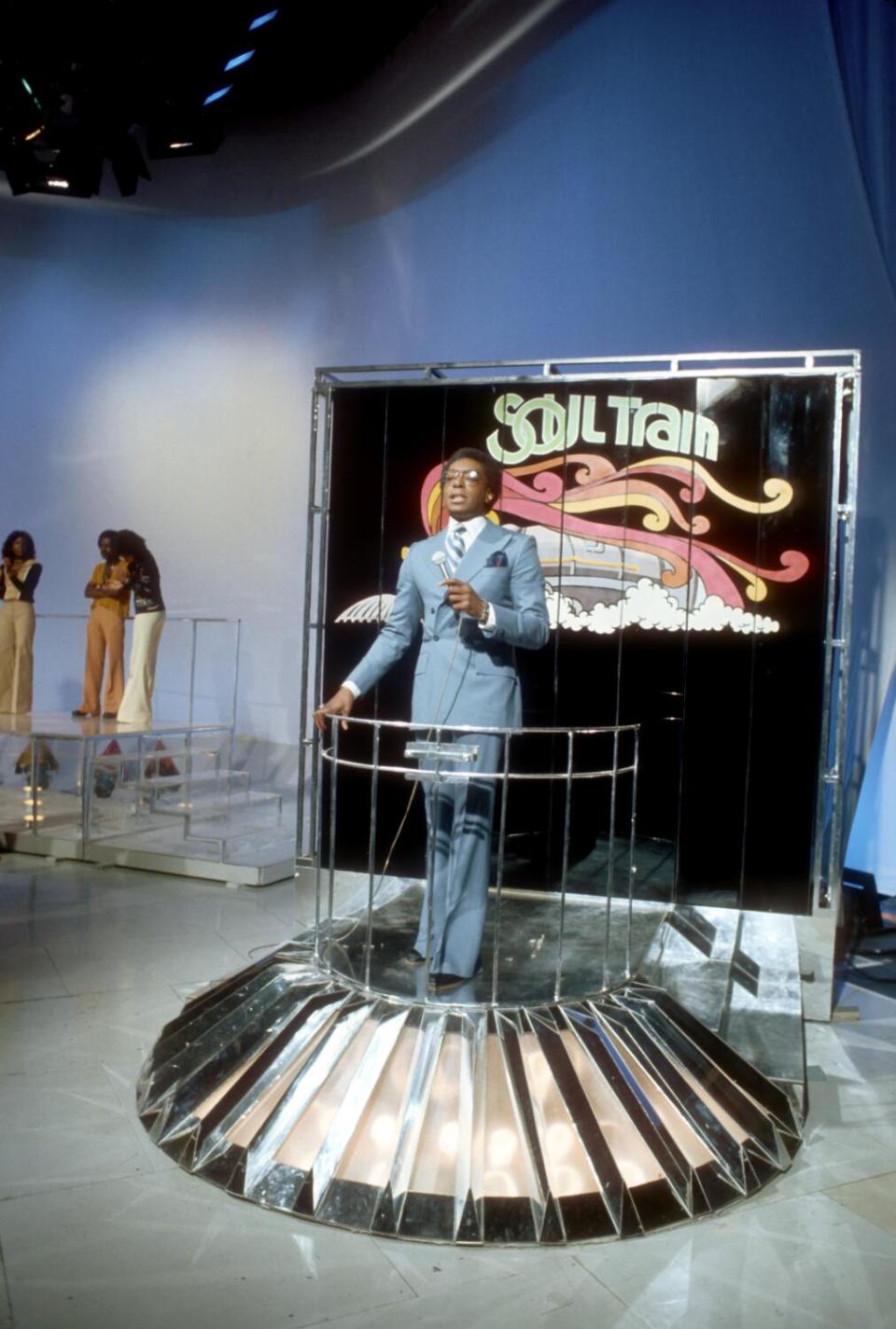Don Cornelius paid 'Soul Train' dancers in exposure. A new musical pays them their due
- Oops!Something went wrong.Please try again later.
- Oops!Something went wrong.Please try again later.
For the record:
2:35 p.m. Sept. 13, 2023: Camille A. Brown is the show’s choreographer. Her associates, Adesola Osakalumi and Rickey Tripp, were incorrectly credited as choreographers.
It's arguably impossible to overstate the cultural impact of "Soul Train." Throughout its 35-year run, the groundbreaking weekly series simultaneously served as a music industry launchpad for soul and R&B acts, a joyous showcase of talented dancers and their newest moves, and a trendsetting platform for Black fashion and style.
"'Soul Train' offered Blackness in its funkified essence," wrote Todd Boyd, a cinema and media studies professor at USC, for The Times in 1995. "The majority of the films from this era were studio-controlled images that used a Black cast and Black narratives, but seldom used Blacks in any creative or financially beneficial capacity.
"'Soul Train' offered an alternative. The program put the political dictates of Black nationalism into action through popular culture. Finally, African Americans in the mass media were controlling their own image — and their own money to boot."
A Broadway-bound stage show attempts to capture this multifaceted and enduring legacy in its entirety, applauding its triumphs while also acknowledging its controversies.
Read more: Inside the unsavory, unauthorized Hunter S. Thompson musical with Broadway in its sights
Playing its world-premiere run at San Francisco's American Conservatory Theater through Oct. 8, "Hippest Trip — The Soul Train Musical" features more than 30 hit songs and 40 Black social dances while rhythmically recounting how Don Cornelius turned $400 of his own money into the longest-running first-run, nationally syndicated program in television history.
"It was hard work to pull it all off — booking acts, finding dancers, getting everything right from lighting to sound to production design — and my father was a beast in making sure those things happened," said Don's son, Tony Cornelius, who worked with his father on the show and began developing the musical with "Rock of Ages" producer Matthew Weaver a year after Don's death in 2012.

Known to at-home audiences as the show's "velvet-voiced and effortlessly smooth" emcee, Cornelius won over advertisers and music executives behind the scenes to cement "Soul Train" as must-see TV.
"Don was a singular, against-all-odds Black man with visions to change the world, and he had to be so incredibly charming and magnetic to convince all of these people to buy into this dream," said the stage show's director, Kamilah Forbes.
Yet "Soul Train's" path to success was not traveled alone. "This show is a celebration of what Don created, and it's also about what was innovated by young Black people whose contributions defined Black culture, and therefore, global culture," added Forbes of the program's dancers.
The "Hippest Trip" ensemble often steals the show onstage, thanks to costume designer Dede Ayite, wigs designer Mia Neal and choreographer Camille A. Brown. According to Forbes, it's by design: "We wanted to be unapologetic about making sure that they got their due as the forces that were behind the building of this machine."
With a book by Dominique Morisseau ("Ain't Too Proud"), "Hippest Trip" also points out the more troubling parts of the show's history: how Cornelius paid dancers via exposure and Kentucky Fried Chicken dinners instead of fair wages, pitted them against one another for better riser spots and more camera time, and slept with them while he was married.
It all builds to a standoff between Cornelius and Rosie Perez, who refuses to sign to his record label because he repeatedly dissuades her from consulting a lawyer. ("The first act, we're all team Don; the second act, everybody hands Don his ass," said Morisseau with a laugh.)
Hearing about these real-life incidents directly from "Soul Train" alumni over the years is one thing; threading them together as the narrative tension of a production — especially one sanctioned by the brand and a subject's surviving family member — is another.
"To me, Don is Hamlet — he's this brilliant, compelling man, who is a great leader and also his own worst enemy — and he probably would not have liked this show in a way that’s very satisfying to me," said Morisseau. "But I can't compromise what the history of 'Soul Train' was for a Broadway musical. I don't want to ever apologize or erase the truth, but I do like to present the truth with fullness."
Read more: 30 must-see arts events in Southern California this fall
Such comprehensiveness meant writing Tony Cornelius into the musical. Onstage, Don (Quentin Earl Darrington) gets checked by his son and apprentice Tony (Sidney DuPont) about his stubbornness to embrace burgeoning music genres, dance styles, technologies and, ultimately, fellow collaborators in the legacy of "Soul Train."
"The truth is the truth, and it all rang true," said Tony of reading Morisseau's script and discovering himself to be a character. "I trusted Dominique to tell this story, and knew that whatever decisions she made would be the right decisions.
"I've learned that you just have to let artists do what they do, because, guess who gets all the credit?" he added, pointing to himself. "My father taught me that. Who got all the credit for 'Soul Train'? He did."
This story originally appeared in Los Angeles Times.

